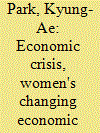|
|
|
Sort Order |
|
|
|
Items / Page
|
|
|
|
|
|
|
| Srl | Item |
| 1 |
ID:
106016


|
|
|
|
|
| Publication |
2011.
|
| Summary/Abstract |
Although many studies have analyzed the gendered impact of economic crisis, few have examined the case of North Korea. This article will explore how North Korea's economic crisis caused changes in women's economic participation. It will also analyze the impact of these new economic roles on the lives of women, and examine the broader implications of these roles for the status of women in North Korea. The North Korean economic crisis changed the pattern of women's economic participation, pulling women out of the formal labor market and driving them into the informal private economic sector. It also forced a number of women to leave their homeland in order to provide support for their own and their families' livelihoods. The new economic roles women have assumed in the wake of the food crisis have affected women's lives in many negative ways, resulting in an increase in their workloads, as well as an increase in the amount of sexual violence and stress of family breakdowns they experience. At the same time, however, these new roles have given women stronger voices in family decision-making matters and allowed them to develop, to some degree, a sense of self-consciousness and awareness of their own rights. Nevertheless, the fact that women have been engaged in new economic activities does not imply that they also have a high likelihood of advancing their socioeconomic status. To the contrary, women's defection from their homeland does not allow them to voice their opinions in matters related to the existing gender inequalities. Moreover, North Korean women are not considered capable of forming a critical mass, as they lack economic, social, political, and organizational resources to collectively voice their discontent. Furthermore, the neo-Confucian tradition of male superiority that is still firmly entrenched in the society is a major barrier that remains to be overcome.
|
|
|
|
|
|
|
|
|
|
|
|
|
|
|
|
| 2 |
ID:
136300


|
|
|
|
|
| Summary/Abstract |
As middle-class Indian women become economically more active, it is worth exploring who is doing the housework. Are gender roles shifting within the household across the board in urban India? This paper shifts research attention away from the metropolitan cities to a small mofussil town, a relatively conservative urban centre where gender roles have so far been more resistant to transformation than in metropolitan cities that are undergoing radical changes about which much has been written. The methodological tool used in the study is a time-use survey, aimed primarily at extracting quantitative data, to make visible the unseen, unpaid and underpaid work and activities undertaken by women. Individual interviews were used to measure the actual workload of the women as a proxy indicator of gender disparities at the intra-household scale. The paper concludes that conventional sex segregation in household tasks has not changed significantly, and that women's various engagements in the public sphere have doubled the burden of responsibilities. The conceptual and methodological implications of the investigation lie in a reinterpretation of what constitutes ‘work’ for middle-class women, offering renewed understanding of the ways in which women (re)negotiate gendered responsibilities at home and outside of it in rapidly changing times.
|
|
|
|
|
|
|
|
|
|
|
|
|
|
|
|
|
|
|
|
|